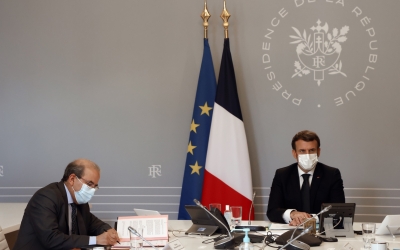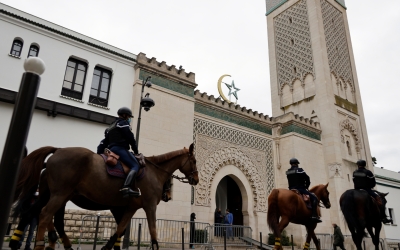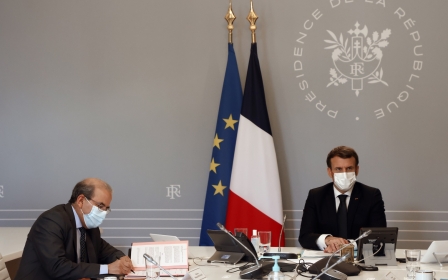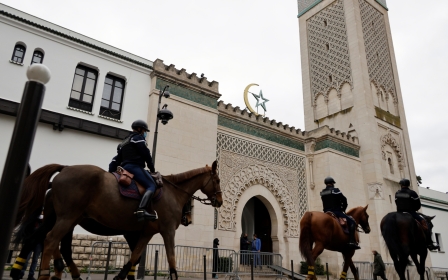Financial Times investigating complaint over Macron's claims about French Muslims
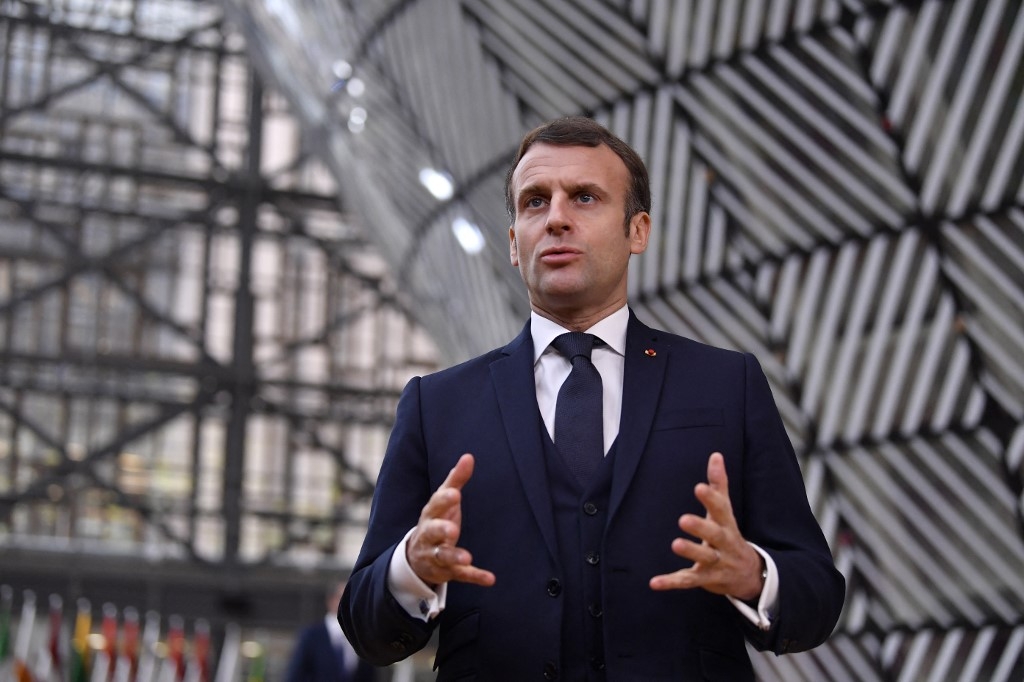
The Financial Times is investigating a complaint that French President Emmanuel Macron issued false and inflammatory statements about Muslims, Middle East Eye can reveal.
Defamation lawyer Greg Callus, who is the British newspaper’s editorial complaints commissioner, is investigating Macron’s claim, made in a letter published in the FT in November, that in parts of France “small girls aged three or four” wore the veil and were “raised in hatred of France’s values”.
Callus’s investigation follows a complaint to the FT by a Muslim reader of the newspaper - a mother from the Paris suburb of Bobigny - whose identity is known to MEE but who has asked for anonymity.
The complaint was referred to Callus in December after Suzanne Blumsom, the FT's executive editor, wrote in reply to the woman that Macron’s letter contained “no significant inaccuracies, misleading statements or distortions”.
The role of the complaints commissioner is to review complaints that cannot be resolved by the FT’s senior editors, according to the paper’s editorial code.
Callus told the complainant on 1 February that he hoped to “be able to publish in days rather than weeks”.
The complaint was made in the wake of a letter from the French president to the newspaper in response to a column by the newspaper’s Brussels correspondent, Mehreen Khan, which criticised his rhetoric towards Muslims.
Macron said he had been “misquoted”, adding that the article “accused me of stigmatising French Muslims for electoral purposes and of fostering a climate of fear and suspicion towards them”. He told readers: “Let us not nurture ignorance, by distorting the words of a head of state.”
'Factual errors'
Khan’s article was withdrawn within hours of being published, with the paper explaining that it had been removed “after it emerged that it contained factual errors”.
The focus of Callus’s investigation is whether Macron’s letter contained its own inaccuracies, which the complainant described as “fake news”.
The most serious is his description of “districts where small girls aged three or four are wearing a full veil, separated from boys, and, from a very young age, separated from the rest of society, raised in hatred of France’s values.”
'[The letter fell] within the bounds of legitimate freedom of expression on the part of a head of state'
- Suzanne Blumsom, FT
In her response to the complainant, seen by MEE, Blumsom defended publication of the letter, stating that it fell “within the bounds of legitimate freedom of expression on the part of a head of state” and on the grounds that there was “strong public interest in such political pronouncements by the French president”.
“French authorities have been objecting for some time to clandestine, unsafe locations where they said that young girls, removed by their parents from registered schools teaching the French curriculum for ‘home education’, were taken during the day for instruction by unqualified people,” said Blumsom.
“Officials say the government has closed several such locations in the past two years. In reference to your first three points, illegal institutions and acts, including making young girls wear full veils, are in many cases by nature hidden from view.”
'No significant inaccuracies'
Four days later, Blumsom wrote again to the complainant, saying: “We have further reviewed your complaint and stand by our previous response that there were no significant inaccuracies, misleading statements or distortions in Emmanuel Macron's letter.”
The next day the complaint was passed on to Callus, who promised that “I will be speaking to the editor and producing an adjudication in due course.”
Following a delay of almost three months, Callus wrote to the complainant, apologising and saying that he was “hopeful I will be able to publish in days rather than weeks”.
Two weeks later the complainant wrote to Callus, saying: “It is now three months since I wrote to the FT requesting evidence to justify Emmanuel Macron’s hate-spreading letter referenced above. It was provably full of fake news.
“In recent weeks you have continually claimed that you are about to publish an objective report on this scandal, but you never do. All of the assurances you have offered to date have come to nothing.”
On Wednesday, Callus told MEE: “I expect to publish this adjudication shortly, hopefully this week. I will be sending it to the complainant and the FT, before putting it up on FT.com, where it will be publicly available.”
MEE has spoken to the Elysee Palace, the Police Nationale, the Ministry of the Interior and other relevant authorities. None have been able to substantiate Macron's claims about small girls wearing a veil and being separated from boys.
Macron’s claims are highly sensitive, coming during a crackdown on French Islam, which has included deportations, bans on mosques and preachers, and new powers to proscribe organisations for fostering Islamism or separatism.
Macron has described Islam as a “religion in crisis”, fundamentally at odds with freedom of expression and the secular values of the French Republic.
This article is available in French on Middle East Eye French edition.
Middle East Eye delivers independent and unrivalled coverage and analysis of the Middle East, North Africa and beyond. To learn more about republishing this content and the associated fees, please fill out this form. More about MEE can be found here.


